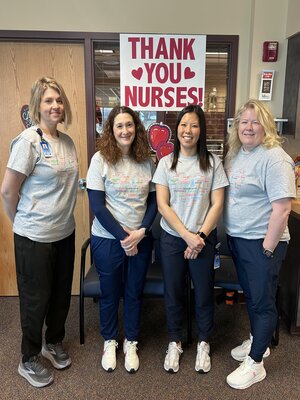
Pictured is four cardiac rehabilitation staff members. They are standing shoulder to shoulder while smiling in an office.
Cardiac Rehab
This outpatient health service is for recovery and health maintenance after a heart related event as prescribed by your cardiologist.
We Provide
Through this 12-week program, emphasis is focused on exercise, nutritional counseling, and behavior change. This is a supervised program that focuses on 5 heart healthy components:

Regular Exercise

Heart Healthy Nutrition

Stress Reduction

Risk Factor Management

Medical Therapy
Exercise
During your time in cardiac rehabilitation, you will spend time exercising with your care team while being provided with education on how to strengthen your heart and live a healthier life. Your care team will work with you to create an individualized program tailored to your needs and goals.
Those that fully participate have been shown to experience the following:

Lower risk for future heart-related events

Improved health factors (e.g. blood pressure, cholesterol)

Improved ability to perform activities of daily living

Improved quality of life
Exercise sessions are held 3 days a week (Monday, Wednesday, and Friday)
Each exercise session lasts 1 hour and includes the following:

Aerobic Exercise (e.g. treadmill walking, stationary biking, recumbent bike)

Strength Training (e.g. dumbbells, arm machine and resistance-bands)
During each session your vitals (blood pressure, heart rate, and oxygen) and ECG will be monitored and recorded to ensure safety.
You will be provided with an exercise prescription that is designed to fit your fitness level, goals, and the severity of your heart condition.
Nutritional Counseling
You may not exercise every day, but you definitely eat every day — so the food that we eat can make a huge impact on our overall health. In cardiac rehabilitation, we focus on two main heart healthy diets: the Mediterranean Diet and the DASH diet. Heart healthy diets, like these, focus on a few key concepts:
Eat these:

Fruits & Vegetables

Whole Grains

Lean Meats

Healthy Fats
Avoid these:

Refined Carbohydrates

Added Sugars

Sweetened Beverages

Processed Foods
Behavior Change
Lifestyle factors play a significant role in your heart disease risk. We will help you identify and address the factors that could have contributed to your cardiac event, including:

Smoking Cessation

Risk Factor Management

Blood Pressure

Cholesterol/Lipids

Diabetes

Depression/Anxiety
Tips to Get the Most from Cardiac Rehabilitation
Enroll: If your Cardiologist refers you to cardiac rehabilitation, make sure you go! It is one of the best ways to improve your heart.
Attend: Try to schedule your sessions during a time you know you can attend. Regular attendance and consistency are keys to investing in a better, healthier future.
Learn: Your cardiac rehabilitation team is your best resource for information. They can help you understand your condition, medications, and lifestyle changes. Be sure to ask questions and use them as a resource.
Set Goals: Work with your cardiac rehabilitation team to set realistic goals to help you progress safely through the program.
Keep at it: After you complete the program, keep going! We offer a self-pay Phase III program. Your goal is to develop lifestyle changes and habits that can help you live a longer, healthier life
For further information, please call 712.364.7284.
